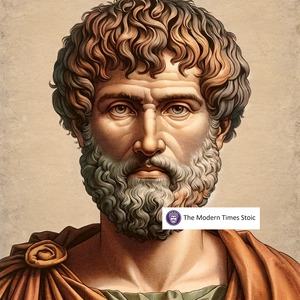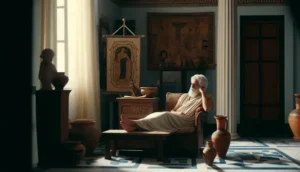In Letter 66, “On Various Aspects of Virtue”, Seneca explores the nature of virtue and its manifestations. It begins with a reflection on his reunion with a former schoolmate, Claranus, who, despite his physical frailties, demonstrates a robust and admirable spirit. Seneca uses this meeting to delve into deeper philosophical discussions about the essence and equality of virtues.
Seneca emphasizes that true virtue does not require physical beauty or strength to shine; it is inherently glorious and can elevate even a weak body. “For virtue needs nothing to set it off; it is its own great glory, and it hallows the body in which it dwells.”
"For virtue needs nothing to set it off; it is its own great glory, and it hallows the body in which it dwells."
Seneca Tweet This Quote
He argues that virtue can flourish under any circumstances, exemplified by people like Claranus, who defy their physical limitations: “For this reason Nature seems to me to breed certain men of this stamp with the idea of proving that virtue springs into birth in any place whatever.” Seneca and Claranus engage in a philosophical discourse on the equality of goods and virtues, examining how they relate to human happiness and the pursuit of a good life: “The first day we investigated this problem: how can goods be equal if they are of three kinds?”
They categorize goods into primary (inherent goods like joy and peace), secondary (goods that arise from overcoming adversity), and tertiary qualities that enhance one’s demeanor. The discussion leads to a debate about the nature of the “First Good” and its intrinsic qualities: “The soul that gazes upon truth, that is skilled in what should be sought and what should be avoided, establishing standards of value not according to opinion, but according to nature.”
Seneca articulates that virtue adapts to different life circumstances without diminishing in value or intensity: “For the Supreme Good cannot diminish, nor may virtue retrograde; rather is it transformed, now into one quality and now into another, shaping itself according to the part which it is to play.”
"For the Supreme Good cannot diminish, nor may virtue retrograde; rather is it transformed, now into one quality and now into another, shaping itself according to the part which it is to play."
Seneca Tweet This Quote
He concludes that virtue, being a reflection of perfect reason, remains consistent and equal across all manifestations, whether it brings joy or requires enduring pain: “Virtue is not changed by the matter with which it deals; if the matter is hard and stubborn, it does not make the virtue worse; if pleasant and joyous, it does not make it better.”
"Virtue is not changed by the matter with which it deals; if the matter is hard and stubborn, it does not make the virtue worse; if pleasant and joyous, it does not make it better."
Seneca Tweet This Quote
Seneca’s reflections underscore a Stoic understanding of virtue as the ultimate measure of a person’s character and life. By presenting virtue as adaptable yet unchanging, he provides a philosophical rationale for valuing moral integrity over physical or circumstantial attributes, promoting a life guided by wisdom and ethical consistency.
***** Letters from a Stoic Key Takeaways is a collection of short key takeaways from the letters sent by Seneca to Lucilius. Read each letter’s key takeways here .







